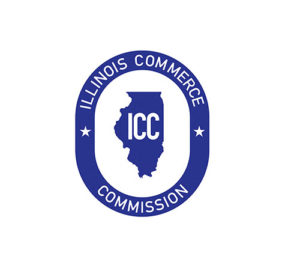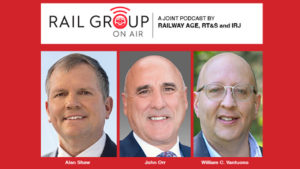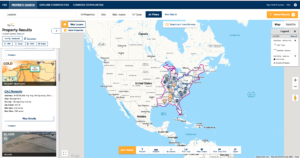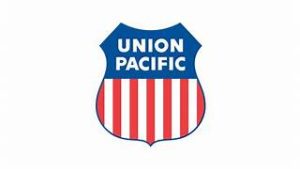UPDATED MARCH 16: Rail Group Staff Report: Global railway industry response to the COVID-19 pandemic
Written by RT&S Staff
The World Health Organization has declared COVID-19, otherwise known as the coronavirus, a pandemic, and the U.S. has declared a National Emergency. The global railway industry is ramping-up its response. Following is a staff report from the editors at Railway Age, Railway Track & Structures and International Railway Journal that will be continuously updated with the latest developments.
FRA EMERGENCY RELIEF DOCKET: Under Federal Railroad Administration regulations, each year FRA creates an Emergency Relief Docket (ERD) in the publicly accessible Department of Transportation docket system (49 CFR 211.45). The ERD for calendar year 2020 is FRA-2020-0002.
On March 13, 2020, FRA Administrator Ron Batory determined that “the imminent threat and exposure to the Coronavirus Disease 2019 (COVID-19) poses a risk of serious illness that constitutes an ‘emergency situation’ as related to railroad operations. Therefore, the Administrator has activated the Emergency Relief Docket (FRA-2020-0002). Notice of the Administrator’s declaration and ERD activation is posted on FRA’s website and in docket no. FRA-2020-0002 on www.regulations.gov.”
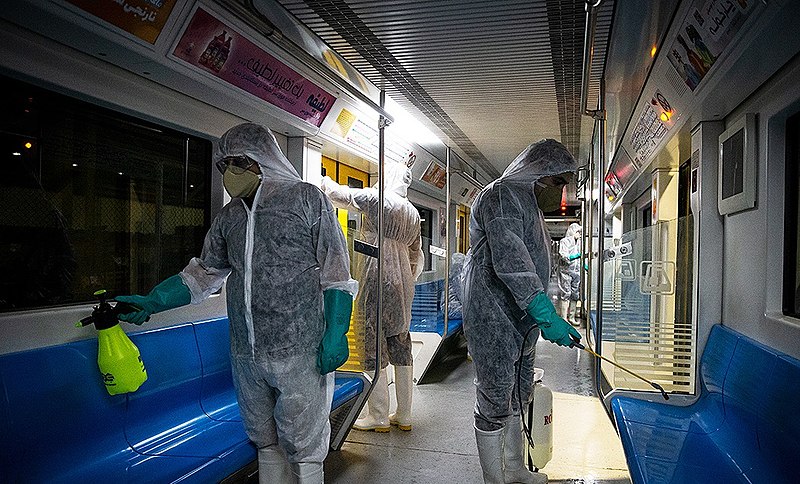
Transit and railroad companies across the globe have been reacting to the coronavirus.
“This message is to ensure everyone has a clear understanding of the emergency waiver process and provide you with a copy of the ERD,” Batory said in a notice to employees. “When the FRA Administrator (or his/her designee) determines that an emergency event or situation exists or is imminent, 49 CFR 211.45 authorizes the Administrator to activate the docket, and railroads may then request relief from FRA regulations related to the emergency. Such requests for relief must address how the request relates to the emergency and, at a minimum, specify (1) how the petitioner or public is affected by the emergency; (2) what FRA regulations are implicated; (3) how waiver of the implicated regulations would benefit the petitioner during the emergency; and (4) how long the petitioner expects to be affected by the emergency. FRA’s Railroad Safety Board will consider any waiver requests submitted to the ERD under the expedited procedures of 49 CFR 211.45 and any relief granted will not exceed 60 days.
“FRA is standing by to review and process any waiver submissions as quickly as possible and in accordance with the requirements of 49 CFR 211.45. In making this determination, the Administrator notes the President has declared a national emergency related to COVID-19 and the World Health Organization (WHO) has made the assessment of COVID-19 and it is now characterized as pandemic, which can cause serious illness to high-risk populations. Governors of several States have issued various Emergency Declarations related to COVID-19 outbreaks. The Centers for Disease Control and Prevention (CDC) has reported more than 1,600 cases across 46 States and the number of cases of this respiratory illness is expected to increase.”
FEDERAL TRANSIT ADMINISTRATION: Expanded eligibility of federal assistance is available under FTA’s Emergency Relief Program to help transit agencies respond to COVID-19 in states where the Governor has declared an emergency. This includes allowing all transit providers, including those in large urban areas, to use federal formula funds for emergency-related capital and operating expenses, and raises the cap on the federal government’s share of those expenses, and permitting those expenses to be covered at an 80% federal share rather than 50%.
In addition to allowing the expanded use of formula funds for transit providers, FTA has established an Emergency Relief docket that allows transit providers in states where the Governor has declared an emergency related to COVID-19 to request temporary relief from Federal requirements under 49 U.S.C. Chapter 53 as well as any non-statutory FTA requirements.
“Today, I have issued a notice of concurrence with declarations of emergencies issued by Governors that relate to COVID-19. FTA grantees may now use their Urbanized Area and Rural formula funds to take measures to protect the health and safety of their riders and their workforce,” said FTA Acting Administrator K. Jane Williams. “Expansion of the permissible uses of federal funds will allow transit providers greater flexibility in the areas of the country that need it most. Invoking the eligibility of the Emergency Relief Program also provide funds at a higher federal share.”
NORFOLK SOUTHERN COVID-19 UPDATE: “Based on the social distancing guidance from the Centers for Disease Control and Prevention and as a prudent precaution, Norfolk Southern is transitioning to remote working arrangements for employees whose job functions permit. This action predominately affects those employees not directly associated with train operations and allows Norfolk Southern to better ensure a safe working environment for those activities that must remain in our offices. The same communication channels exist and all phone numbers and email contacts remain the same. Our expectation is this process will be seamless to you.
“We have restricted access to critical functions in our offices such as our Network Operations Center and implemented social distancing practices for these functions. We have executed general safety actions such as posting information about the importance of hand washing and good hygiene, limiting office visits from non-employees, increasing cleaning regimens, and ordering additional cleaning supplies.
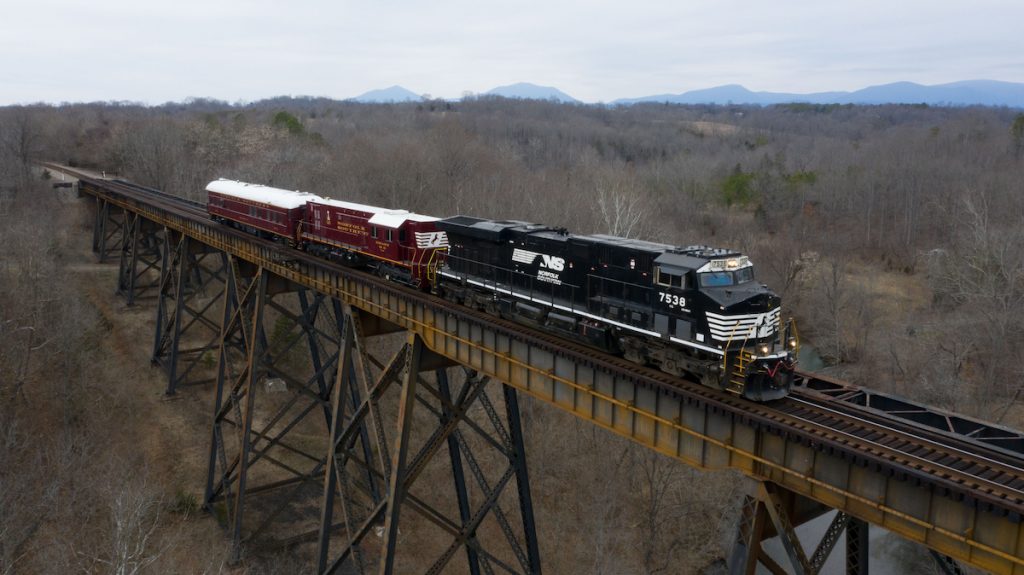
“For our field transportation employees, Norfolk Southern is taking proactive action throughout the network. This includes adding steps in our locomotive servicing process to disinfect all common surfaces, providing sanitizing kits to each crew that will be used to wipe down surfaces at each crew change point, staggering crew briefings to eliminate large collections of crew members at any one point, and working with all of our hotel and taxi vendors to ensure each is also maintaining the highest standards of safety and hygiene for our personnel.
“We have activated Norfolk Southern’s Operations Command Center, staffed with senior management from all our Operating disciplines to closely monitor the situation and ensure we are staying ahead of any potential issues. Marketing and Customer Service are fully integrated in the Operations Command Center to ensure incorporation of changes in customer requirements and open communication with our customers.”
COWEN AND CO. INSIGHT: “Coronavirus impacts are not yet clearly detectable,” says Cowen and Company freight transportation analyst Matt Elkott. “We spoke with rail and truck equipment management teams on [March 12 and 13]. Generally, it does not appear that they have seen quantifiable material impacts on their businesses from the coronavirus outbreak. However, this is likely to change as the pandemic threatens to force recessionary conditions on the global economy. While the high uncertainty of how the outbreak will unfold has kept us from revising most of our earnings estimates, our view that rail and truck equipment production should trough this year has been reinforced.
“There appears to be consensus among investors and companies alike that freight demand will come under significant further pressure in the next several weeks as a result of coronavirus disruptions of global supply chains and negative impact on consumer spending. However, if springtime virus containment hopes begin to materialize, a somewhat abrupt rebound could occur, driven by replenishment of depleted inventories.”
RAILWAY AGE INSIGHT, CONTRIBUTING EDITOR JIM BLAZE: “Thinking like a rail economist, following are alternate views about the potential consumer- and services-led U.S. economic decline during first-half 2020. Questions: What could be the impact on a second-half 2020 recovery timeline? Where does rail freight fit in, as there aren’t very many historical experiences upon which to ponder? (How many consumer/medical fear-driven recessionary events have we lived through?)
“I base these observations in part on my thinking about a March 14 Washington Post story written by Economics Correspondent Heather Long and one of her associates. The specific rail freight references are mine.
“More than 18 million Americans work in industries that are being hurt by the initial efforts to contain the virus: travel and tourism, spectator sports, museums, hotels, passenger railways, the performing arts and food services (restaurants, bars and pubs, fast food, etc.) according to JPMorgan Chase economist Michael Feroli. Average revenue lost by such cancelled events is huge, and based upon each unit not purchased. These non-consumed items are not simply postponed. They won’t occur later. There is little ‘make-up’ here. Activity in the services sector of roughly $2 trillion of the U.S. annual economy ‘will be significantly depressed for three months—longer if the virus does not dissipate in the summer,’ wrote Feroli in a March 12 note to clients Thursday. By the end of this month, the global economy probably will have shrunk by 1.2%, ‘not far short of the 1.6% drop in world output seen at the depth of the global final crisis’ during the fourth quarter of 2008, according to Capital Economics in London. Within three weeks of the first reported coronavirus death in a Seattle suburb, restaurant reservations in the city fell nearly 60%, according to OpenTable, the online service. No one is going to double-up later on for missed meals out over the past few months. On March 13, Delta Air Lines said it is slashing flights by 40%, the largest reduction in Delta’s history, surpassing even that executed after the Sept. 11, 2001 terrorist attacks. Energy prices should be a lot cheaper. ‘We’ll see a huge surge in oil supply over the next few weeks and no demand for it. We think the price will dip into the $20 range and could even touch the teens,’ according to Francisco Blanch, head of commodities and derivatives research at Bank of America.
“For freight railroads, what does all this mean? Ironically, lower street fuel prices could actually hurt rail freight’s search for market share vs. trucking. But consider the following: Many trucking companies may be forced to cut capacity and lay off drivers, with some companies filing for bankruptcy. That disruption might help railroads gain market share. The intermodal rail freight sector might start to recover international container volume by mid-April—but will there be a shortage of truck drayage drivers? Domestic intermodal recovery might be dependent upon the support required to re-stock grocery stores and forwarding warehouses that are low on inventory. But, who has market logistics intelligence correlated to intermodal rail use? The railroads? Probably not. J.B. Hunt or Hub Group might. Nothing is crystal clear.”
AMTRAK: A Saturday schedule is in effect on several routes. “We continue to monitor the coronavirus situation closely and we are taking action based on guidance from public health experts; that includes restoring service to trains and routes once demand returns,” Amtrak said in a service bulletin. While Amtrak continues to operate, in order to maintain a safe environment and address customer concerns and potential business impact, we have modified schedules to the following services due to reduced demand:
- “Northeast Corridor: We will be temporarily implementing revised Northeast Corridor schedules effective Monday, March 16 through Sunday, March 29, by running the typical Saturday schedule on a daily basis. Frequent service will be available on Acela and Northeast Regional trains between Boston, New York, Washington, and Virginia.
- “Keystone Service: In coordination with the Pennsylvania Department of Transportation, starting Monday, March 16 through Sunday, March 29, Keystone Service will be operating on its Saturday schedule on a daily basis, with no service to the Ardmore, Paoli, Downingtown, Parkesburg, Cornwells Heights, Coatesville and Exton Stations.
- “Amtrak Hartford Line and Valley Flyer: Starting Monday, March 16, Amtrak Hartford Line and Valley Flyer Service will be operating on its Saturday schedule on a daily basis.
- “New York State Service: Starting Sunday, March 15, the Maple Leaf will only operate between New York Penn Station and Niagara Falls, N.Y., and the Adirondack will only operate between New York Penn Station and Albany, N.Y. (VIA Rail Canada is not permitting Amtrak trains that serve Canadian destinations to cross the border—Editor)
“Minor additional schedule adjustments may be made during this time. Customers with reservations on trains that are being modified will typically be accommodated on trains with similar departure times or another day. Amtrak will gladly waive additional charges for customers looking to change their reservation during the modified schedule by calling our reservation center at 800-USA-RAIL. Anyone planning to travel should check their train status on Amtrak.com or our smartphone apps prior to departing, allow extra time to get to the station. Be extremely careful in stations and on platforms.”
Amtrak said it is stepping up cleaning. New protocols include more frequent (in some cases hourly) cleaning of trains and stations. Amtrak crews are wiping handrails, doorknobs, handles and surfaces, and the railroad is making hand sanitizer and disinfectant wipes available to passengers and workers aboard trains and in stations.
Amtrak trains are operating half-empty, cancellations are up 300%, and future bookings are down 50%, according to a Washington Post report. If this continues, revenue losses could be in the “several hundred million dollars,” prompting aggressive cost-reduction measures that include service cuts and “voluntary unpaid leave,” Senior Executive Vice President and Chief Operating and Commercial Officer Stephen Gardner said in a March 11 memo to Amtrak employees.
“At this rate, we believe we will likely suffer the loss of several hundred million dollars in revenue during this fiscal year — and we might lose more,” Gardner said. “You should expect significant reductions in train service across portions of our network in response to the sharp drop in ridership. Shortly, we will begin rolling out our voluntary leave program for those non-mission critical employees that are willing to take time off on an unpaid basis.”
VIA RAIL CANADA: In light of the recent measures being taken to help prevent the spread of COVID-19, VIA Rail’s overnight trains (Toronto-Vancouver Canadian and Montreal-Halifax Ocean) have been cancelled beginning March 13, 2020. These trains will not be operating from March 13 to March 27 inclusively, with the possibility of extension. Via Rail is not permitting Amtrak’s Maple Leaf and Adirondack to cross the border.
NJ TRANSIT: Following the lead of the New York Metropolitan Transportation Authority (MTA), New Jersey Transit is stepping up preventive measures. NJT has formed a task force that will meet regularly and share the latest information from state and federal health officials. The task force consists of representatives from medical, emergency management, environmental, safety and communications departments. Like the MTA, NJ Transit is disinfecting its stations and railcars. “NJ Transit Rail, Bus, Light Rail and Access Link will enhance current cleaning procedures to augment our daily current practices and additional disinfection regimens,” the agency said in a statement.
CALIFORNIA: Caltrain and VTA (Santa Clara Valley Transportation Authority) have made cutbacks in service. Caltrain has cancelled Baby Bullet service between San Francisco and San Jose during the morning and afternoon rush hour. There has been a 75% drop in one-way Caltrain ridership. Meanwhile, school closings have VTA cutting public transit centered around serving school children. VTA will run single-car light rail trains instead of two- or three-car trains. Bay Area Rapid Transit (BART) also has been experiencing a ridership drop, but is still running at full capacity. Officials at BART, Caltrain and VTA said more cuts in service could be in store, and BART has plans to shut down its system entirely if necessary.
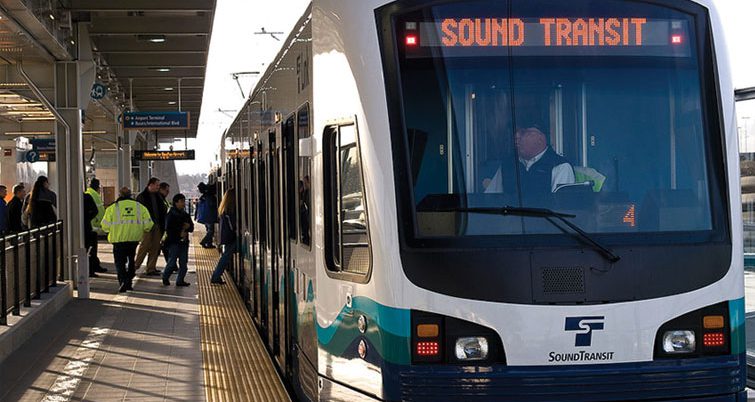
Following first coronavirus death officials in King County, Wash., making sure train cars are sanitized.
WASHINGTON STATE was the first region hit hard by the coronavirus, and Sound Transit, which includes Link light rail and Sounder commuter rail, were the first transit agencies in the U.S. to feel the impact of the disease. There were 25% fewer riders in February 2020 compared to January 2020, and between March 2 and March 9 there was another 15% decline.
WMATA: The Washington, D.C., Metrorail system is expected to implement service cuts after it carried 100,000 fewer riders on March 11, compared to March 4.
RAIL LABOR: The two unions representing T&ES (Train & Engine Service) employees—the Brotherhood of Locomotive Engineers and Trainmen (BLET) and the SMART-Transportation Division—sent a letter, signed by BLET President Dennis Pierce and SMART-TD President Jeremy R. Ferguson, to the Federal Railroad Administration (FRA) “urging [issuance of] guidelines directed toward U.S. rail carriers, employees and passengers, pertaining to, at minimum:
- “Sanitizing equipment such as (but not limited to) locomotive cabs, computers, remote control boxes, and communal areas such as passenger cars, offices, crew staging areas, company provided ground transportation, and away-from-home lodging facilities.
- “Providing crews and passengers with personal protective equipment, alcohol-based hand sanitizer strong enough to kill viruses, and other cleaning supplies as deemed appropriate.
- “Encouraging employees to stay home if they have respiratory symptoms, (coughing, sneezing, shortness of breath, and/or fever) and to leave work if they develop such symptoms while at the workplace. In doing so, we ask that FRA strongly encourage carriers to relax current attendance policies which can be described as unforgiving, at best, to employees who miss work due to illness.
- “Educating all rail employees (including supervisory staff) on the appropriate guidelines for self-monitoring of their health condition, as well as monitoring and addressing others who appear to be symptomatic.
- “Reporting to the appropriate health departments where employees have shown aforementioned symptoms that prevent them from carrying out their assigned duties.
- “Developing plans for employees who reside with, and/or come into direct contact with individuals who are symptomatic.
- “Encouraging carriers to develop health programs and practices that exceed FRA’s recommended guidelines.
- “Encouraging all parties to understand and comply with other such guidelines issued by the CDC (Center for Disease Control and Prevention).
Additionally, Pierce sent a similar letter to the National Railway Labor Conference, the American Short Line and Regional Railroad Association (ASLRRA) and the American Public Transportation Association (APTA). Regarding sanitation, BLET wants railroads to supply hand sanitizer and wipes that contain 60-90% isopropyl alcohol. Wipes also should carry chlorhexidine gluconate (4%) and benzethonium chloride (0.5%).
FRA responded to the BLET/SMART-TD letter by saying that it “has taken a whole-of-government approach that has paved the way for a whole-of-America response, with the CDC being the appropriate governmental source for guidance on COVID-19.”
Commenting on the BLET/SMART-TD letter, Railway Age Capitol Hill Contributing Editor Frank N. Wilner noted that the FRA “has no authority in this area,” and that because the letter was not sent to the railroads, it “perhaps was intended to avoid a quid pro quo response from the carriers—the trade being authority to institute one-person crew operations that the two unions are refusing to consider at the bargaining table.”
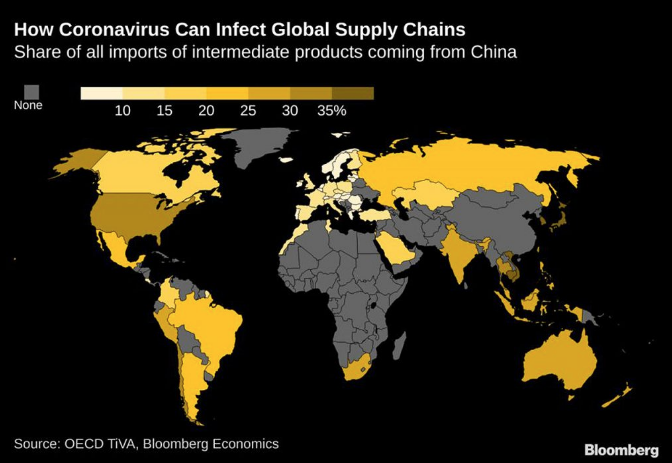
APTA: The organization has cancelled its Legislative Conference, scheduled to take place in Washington, D.C. from March 15-17. APTA said it “continues to monitor federal legislative action and its impact on public transportation on behalf of the industry. The association is considering alternatives and potential avenues through which to reschedule, relocate or redesign this conference for later in 2020. APTA’s top priority is the health and safety of our members and the health and safety of the communities they serve. This decision allows public transportation leaders to stay in their communities where they can focus on the health and safety of their riders and employees while continuing to provide safe and efficient transportation for the millions of Americans who rely on public transit.”
OVERSEAS DEVELOPMENTS
Numerous railway industry events overseas have been postponed or cancelled as organizers respond to the restrictions being placed on large gatherings of people to prevent the spread of the coronavirus. As well, the UIC (International Union of Railways) has formed a task force to assist operators in dealing with the rapidly escalating situation, and several overseas train operators have instituted aggressive measures, including more stringent train cleaning, steps to protect staff, ticket refunds without penalty and cancellation of services. However, numerous cross-border services have been shut down.
- Hong Kong’s Mass Transit Railway (MTR) is deploying 20 Vaporized Hydrogen Peroxide (VHP) robots to deep-clean trains at depots as well as stations to improve protection against the spread of coronavirus. The VHP Robot was developed jointly by MTR and Avalon Biomedical, a Hong Kong biotechnology company. The robots are designed to automatically spray hydrogen peroxide solution, which is atomized to a specific concentration to ensure that disinfectants penetrate small gaps which are difficult to reach during normal cleaning. The objective is to eliminate viruses and bacteria such as staphylococcus aureus and Escherichia coli. MTR says the VHP Robot has passed tests and achieved the desired results. VHP Robots operate automatically by pre-setting the floor plan of the designated area. It is also possible to remotely control the robot manually within a distance of 20 meters using a mobile device. MTR says it normally takes about four hours to clean an eight-car train in automatic mode. MTR staff can also deploy the VHP Robot to deep clean a special situation, such as a passenger vomiting on a train, using diluted bleach. The robot recently disinfected staff facilities and passenger lifts at Mong Kok East station after a member of staff was diagnosed with Covid-19.
- Intermodal freight operators in Europe have called for a number of measures to be put in place to allow freight to continue to move, especially during the lock-down in Italy. An open letter addressed to Italian and European institutions outlines why intermodal freight via rail is well-placed to move goods while limiting the risk of spreading Covid-19. The letter was signed by the National Association of Automotive Transport Companies (ANITA); Railway and Intermodal Operators Association (ASSOFERR); Assologistica; Fercargo; Fercargo Manovra; Fercargo Rotabili; Fercargo Terminal; SOS Logistics – Association for Sustainable Logistics; Association of Freight Villages (UIR); European Shippers’ Council (ESC); European Rail Freight Association (ERFA), Brussels; European Railways Network (NEE); and the International Union for Road-Rail Combined Transport (UIRR).
- Trenitalia and NTV-Italo have cut the frequency of their high-speed services. Both operators have closed their passenger lounges at stations, suspended at-seat service and are trying to maintain a three-meter distance between passengers inside trains. Trenitalia has installed hand sanitizers on trains, and both operators have stepped up train cleaning. NTV-Italo has issued train staff with specific instructions as well as protective equipment such as masks, disposable gloves and hand sanitizer.
- Thello has suspended both its overnight sleeper service between Venice, Milan and Paris, and its day trains linking Milan, Nice and Marseille until April 3. However, French National Railways (SNCF) appears to be still running its Paris – Turin – Milan TGV services.
- The EuroCity service linking Munich, Innsbruck and cities in northern Italy, operated jointly by German Rail (DB) and Austrian Federal Railways (ÖBB), has been suspended south of Innsbruck.
- DB (German Rail) says it has increased the use of soap and disinfectants on trains by up to 20% and is gradually reducing the already tight intervals for cleaning long-distance trains from four to two hours. But Germany’s decision to close its border with Austria, Switzerland, France and Denmark due to the coronavirus pandemic means that international passenger services to most of these countries have been cancelled. This follows the decision last week by Poland and the Czech Republicto close their borders with neighboring countries. DB is working with the Federal Ministry of the Interior to reduce the frequency of high-speed services between Germany and France. These changes will come into effect on March 17. DB is also continuing to operate a full domestic long-distance timetable and will continue to run regional services unless individual German states or contractors decide otherwise. However, local cross-border services to Poland have been cancelled.
- Austrian Federal Railways (ÖBB) Nightjet services on the Munich – Salzburg – Villach – Italy route are only running as far as Villach in Austria, while Nightjet trains on the routes from Berlin and Hamburg to Vienna and Zürich have been cancelled. ÖBB has also cancelled all passenger services crossing the border to Switzerland.
- Russia Railways (RZD) has cancelled all international passenger services to Latvia, Lithuania, Ukraine and Moldova.
- Israel Railways has withdrawn passenger services on the following routes: Rishon Le-Zion Harishonim – Lod, Beit-Shemesh – Jerusalem Malkha, and Dimona – Beer-Sheva North/University. This was after 34 train crew were put into isolation after helping passengers who were infected by the coronavirus.
- Danish State Railways (DSB) introduced a range of measures on March 11. These include running longer trains during off-peak periods to allow passengers to sit further apart from one another, making all tickets refundable at no charge, no longer accepting cash payments onboard trains, deploying more staff at critical locations, and improving communication with passengers.
- The Czech Republic government has prohibited all cross-border passenger train, bus and boat services. The restrictions, which will remain in place for 30 days, will also affect international air passenger transport. Only road vehicles with nine or fewer people on board will be allowed to cross the border unless they are conveying Czech citizens returning to the country or foreigners leaving the Czech Republic. However, empty passenger trains will be allowed to cross the border.
- Swiss Federal Railways (SBB) has made changes to services to and from Italy that will remain in effect until April 5. On the Gotthard route, six Zürich to EuroCity trains will only operate between Chiasso and Zürich, within Switzerland. On the Simplon route, Geneva to Milan and Basle to Milan trains from Milan will only run within Switzerland.
- Croatia is stopping people from infected areas entering the country and Slovenia has suspended cross-border services to Italy.
- In Spain, Renfe is continuing to operate its normal suburban timetable in major cities. However, it is only operating 50% of its long-distance and high-speed services and is restricting the capacity of each coach to 30% to ensure a safe distance between passengers. All on-board catering has been withdrawn. Renfe has also decided to postpone the introduction of its new Avlo low-fare high-speed service, which was scheduled for April 6.
- The International Railway Congress in Vienna, organized by Austrian Federal Railways (ÖBB) and Russian Railways (RZD), originally scheduled for March 26–27, has been postponed until Autumn 2020. The organizers say registration to the event will remain open and all fees for the event will remain in place for the new congress date.
- The 7th Biennial International Railway Forum & Conference (IRFC) in Prague has been postponed from March 26–27 to November 30-December 2.
- The Rail Industry Meetings event in Valenciennes, France, has also been rescheduled from March 25-26 to June 3-4.
- The International Association of Public Transport (UITP) has published a detailed set of guidelines for public transport operators in its Management of Covid-19 factsheet, which is available to view on the UITP website.
- The UITP/Mena transport congress and exhibition, due to take place in Dubai from April 13-15, has been rescheduled to October 5-7.
- The EU Agency for Railway’s Rail Safety Days event, planned for May 26-28 in Valenciennes, has been cancelled, although the Agency intends to hold the event at a later date.
- Terrapinn and Spain’s railway industry association Mafex have postponed the Rail Live conference and exhibition in Madrid on March 31-April 2. Postponement of Rail Live followed postponement of IT Trans in Germany on March 3-5, the Rail Forum Europe conference on the EU’s Green Deal on March 18, and the International Union of Railways’ (UIC) World Congress on High-Speed Rail in Beijing, which was due to take place June 30 to July 3.
- InnoTrans 2020 (Sept. 22-25, Berlin) organizers have not announced postponement plans, instead choosing to ramp-up marketing efforts related to exhibitors from the cleaning industry: “Cleanliness and hygiene on buses, at stations, bus stops and on trains are becoming an increasingly important aspect for users of public transport and rail networks. This is also reflected in the growing size of the cleaning industry segment at InnoTrans 2020. In Hall 6.2 a variety of leading international companies will be exhibiting their innovative products for optimum cleanliness at InnoTrans. The focus this year is on efficient cleaning systems and those manufactured to customers’ specifications. The displays also include toilet waste disposal systems, washing units as well as cleaning agents, care products and disinfectants.”
RAILWAY AGE EDITOR-IN-CHIEF COMMENTARY: As the COVID-19 pandemic continues its onslaught, it has been discussed on various credible, reliable news media outlets (CNN, CBS, NBC, ABC, etc.) whether climate change—global warming, which is real—had a role in the outbreak. Given the effects of climate change—an increase in severe weather globally, flooding, population shifts, natural habitats destroyed and the effect on wildlife—it is likely a contributing factor. Disease does not exist in a vacuum.
We in this industry know that railways, freight and passenger, are the most environmentally friendly and safest transportation mode—bar none. There are numerous examples of what the industry is doing to be “greener” and, in effect, address climate change. Here’s one whose timing and intent is particularly encouraging:
Union Pacific on March 10 declared its intention “to set science-based targets to determine how much and how quickly the company will reduce greenhouse gas (GHG) emissions to support global climate change goals. A commitment letter was submitted to the Science Based Targets Initiative (SBTi), which independently assesses corporate emissions reduction targets in line with what climate scientists say is needed to meet the Paris Agreement goals—limiting global warming to well below 2°C above pre-industrial levels. The company’s target will use the SBTi’s Sectoral Decarbonization Approach Transport tool, which models targets for direct and indirect transportation emissions. Union Pacific anticipates finalizing its target and submitting it for approval to the SBTi within a year.”
It is encouraging that Union Pacific is in step with the Paris Agreement, an initiative the Trump Administration rejected and withdrew from soon after POTUS took office in January 2016. – William C. Vantuono.
HUMOROUS BUT DISTURBING NONETHELESS: “Nobody ever lost a dime underestimating the intelligence of the American public,” comments one industry observer, who shared this obviously doctored photo with Railway Age:
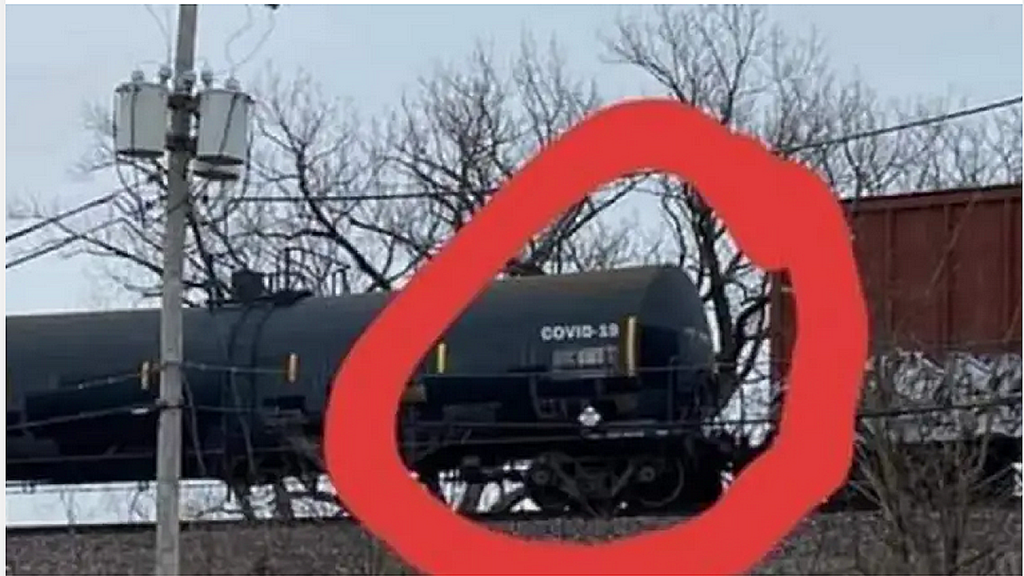
Reporting and analysis by David Briginshaw (IRJ), David Burroughs (IRJ), Andrew Corselli (Railway Age), Kevin Smith (IRJ), David Lester (RT&S), William C. Vantuono (Railway Age) and Bill Wilson (RT&S); plus Railway Age Capitol Hill Contributing Editor Frank N. Wilner and Contributing Editor Jim Blaze.

